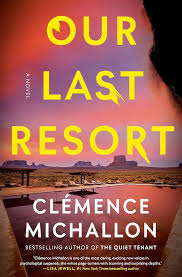Picture it: you’re eighteen years old, in the most beautiful place you have ever seen. It’s located in the desert, in Utah. The architecture is like nothing you’ve seen before. It’s modern but somehow in touch with the wilderness around you. The lines are straight; everything is a shade of terracotta or beige. Your room, like every other room, is located on one floor; there is a large window in your bathroom that directly overlooks the desert. Technically, someone could walk right outside of it—but no one will, because the hotel has a way of directing its guests’ steps away from its periphery and back toward its center.
The hotel is isolated, accessible only by one blink-and-you’ll-miss-it access road. At night, you might spot a coyote, a hotel employee tells you as she leads you to your room. You wonder: what the hell is this place?
It’s expensive. That, you know for sure. Years later, when you write a novel set at a hotel very similar to this one, you’ll consider going back in the name of book research, before conceding it would be too unwise a financial decision. Yet, while staying at this hotel is borderline ruinous, no one ever seems to take out a credit card or cash. Everything has been prepaid. It’s another trick the hotel plays on you: it wants you to forget about money. It wants you to forget about material comforts altogether—even as it drowns you in them.
Beautiful hotels are like this: daringly, flashingly at ease with their own contradictions. My desert resort was at once beautiful and a little bit dangerous; utterly isolated yet sought-after. After my debut thriller The Quiet Tenant came out and I started thinking about what to write next, my mind traveled back to that devilish place.
There’s something about the combination of beauty and money that sets a novel on fire. So many details become revealing when examined through those lenses. What’s a character wearing? What are they eating, drinking? How does it square with their surroundings?
The White Lotus, of course, is the perfect example of this. In the most recent season, Piper Ratliff, who arrives to the resort with her wealthy parents and two brothers, tries to keep a kind of stiff neutrality vis-a-vis her plush surroundings (which makes sense, considering she is—spoiler alert—planning on staying in Thailand to live frugally at a Buddhist temple for a year). Her mother Victoria, who views material wealth not just as a core part of her identity but also as a quasi-requisite for existing (“I don’t know if I’d want to live,” she tells her husband when he asks her what would happen if they lost everything.) Where Piper sits with her back straight, reading books and meditating, Victoria is almost constantly sprawled on some kind of surface, be it a bed or a couch, almost literally rolling around in luxury.
Gabriel and Frida, the two lead characters in my new crime novel Our Last Resort, travel to a White-Lotus-esque hotel hoping to have a family reunion after a few years apart. They grew up in a cult together, and when a guest at the hotel turns up dead (evidently murdered), they’re going to have to confront secrets from their past—the kind they were hoping would stay buried forever.
As I wrote the novel, I quickly realized that putting Gabriel and Frida in an incredibly high-end environment was a handy way to show the reader how they’ve adapted (or failed to adapt) to the outside world. When the novel starts, fifteen years have passed since they left the cult. Are they comfortable around other people? Can they fit in? Which of them knows how to dress, how to act? Which one struggles to fit in? Who’s comfortable around wealth and who isn’t?Who’s paying for this stay, and how?
Those aren’t things my characters want to think about. Talking about money—especially in the context of family or friendship—is easily fraught. This is true in the US, and it’s even truer in France, where I’m from. (For years, I found it hard to tell my friends how much I was paying for rent in New York.) The great minds behind Friends made 236 episodes, and only a couple of them openly discuss the financial discrepancies between the characters. And those characters are usually uncomfortable! See: the season six episode “The One on the Last Night”, where Chandler, seeking to give $1,500 to a broke Joey, makes up an entire game called “Cups” to save him the embarrassment.
A luxury hotel offers no such shortcut. Gabriel and Frida’s resort forces them to confront awkward truths about their dynamic constantly. In the context of a crime novel, this is gold for a writer: my characters graduate from these small discrepancies to wrestling with high-stakes buried truths. There’s nowhere to run, either. It’s like the Eagles sang: they can check out any time they like, sure. But in such a beautiful, isolated place, surrounded by an inhospitable landscape… leaving is another story.
***


















